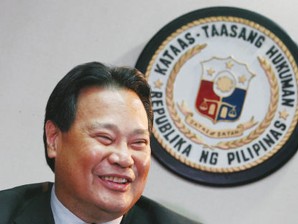The defense in the impeachment trial of Chief Justice Renato Corona is open to disclosing his statement of assets, liabilities and net worth (SALN) as of Dec. 30, 2011, but says he needs the permission of the other members of the Supreme Court.
Ramon Esguerra, one of Corona’s defense lawyers, on Thursday said the permission of the other magistrates was necessary because the Supreme Court had guidelines for the disclosure of the justices’ personal financial reports.
The defense does not want to compromise the other justices, Esguerra said in an interview with the Philippine Daily Inquirer.
“Even if it’s evil, it’s a necessary evil,” he said in jest, referring to Corona’s disclosing his finances.
Corona and the other justices have submitted their SALNs for 2011 to the clerk of the Supreme Court. But as guidelines dating back to 1989 require privacy, the financial reports could be released to the public only upon request and with the permission of the court.
The Senate and the House of Representatives have similar procedures for the release of SALNs. An 11-member panel from the House is prosecuting Corona, and the senators are the judges in his trial, which resumes on Monday.
Standing rule
“Because there is a standing rule, the Chief Justice would have to abide by it,” Esguerra (no relation to this reporter) said.
Defense lawyers consider the second article of impeachment the most contentious issue in the trial, especially after prosecutors led by Representative Niel Tupas Jr. dropped five of the eight articles they had brought against the Chief Justice.
But with the trial now in its final stage, Corona’s lawyers are convinced that he need not appear in the Senate to testify in his own defense.
“It is clear that the prosecution has failed to establish any impeachable offense by the Chief Justice,” defense lawyer Tranquil Salvador told the Inquirer in a separate phone interview.
Atienza resumes testimony
The trial will resume next Monday with defense witness Lito Atienza, a former mayor of Manila, continuing his testimony on the city government’s purchase of property owned by the family of Corona’s wife, Cristina, for P34.7 million in 2001.
Cristina received the payment on behalf of the family-owned Basa-Guidote Enterprises Inc. But while the money was deposited in the Coronas’ bank accounts, the Chief Justice did not declare it in his SALNs. The defense said Corona did not declare the money in his financial reports because it is not his, but the company’s.
Senator Miriam Defensor-Santiago seems convinced. “So it turns out that it is not [his] money. It’s not the money of his wife, but that of the company,” Santiago said in an interview on radio in March. “So, it was only proper that he did not include it [in his SALN].”
Corona’s lawyers are keen on questioning Justice Secretary Leila de Lima, who has refused to return to the trial as a hostile witness for the defense.
De Lima testified for the prosecution, on the allegation that Corona tried to help Gloria Macapagal-Arroyo leave the Philippines in November last year through a Supreme Court temporary injunction on a Department of Justice order barring the former President from leaving the country.
One-sided
The impeachment court allowed De Lima to testify, but declared her testimony as hearsay because it was based only on the dissenting opinion of Supreme Court Justice Maria Lourdes Sereno.
“She presented only one side of the coin, that’s why we want her back to complete the story,” Salvador said, noting that the subpoena issued for De Lima’s testimony is a “compulsory process.”
The subpoena stands unless the prosecution files a motion to quash and it is granted by the impeachment court, Esguerra said.
“[Appearing] is her responsibility to the impeachment court, not to the defense,” he said.
From 10 to 5 witnesses
Salvador said the defense would present at least 10 witnesses and could wrap up its presentation within the month. Esguerra said the number of witnesses could go down to “5 or 6” because his team could dispense with other “corroborative witnesses.”
“We want to abbreviate the proceedings and, depending on the cross-examination, we could be done in two to three weeks,” Esguerra said.
